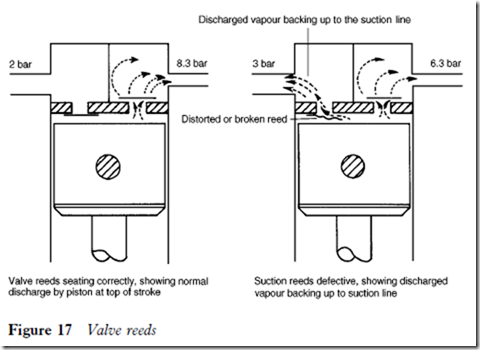High suction and low discharge pressures
This condition is usually due to a fault within the compressor, such as broken valve reeds or incorrect seating of the valve reeds.
If the suction reeds are at fault, some of the discharged vapour will be forced back into the suction side of the compressor as the piston reaches the top of its stroke.
Faulty discharge reeds will contribute to longer running time, poor refrigeration effect and lower than normal operating head pressure. During an off cycle the discharged vapour will leak back into the cylinder(s), causing
a pressure rise which will actuate a low pressure switch and quickly restart the compressor if this is the temperature control.
Figure 17 shows the passage of refrigerant through compressor valves with serviceable and defective valve reeds.
Compressor valves can become distorted and fractured if liquid refrigerant is allowed to enter the cylinder; this is known as liquid slugging. For this reason service cylinders should never be inverted during the low side charging of a system.
Valve seats and reeds can become pitted if metal filings or small particles of grit are allowed to enter pipework during installation or repairs. They may circulate with the refrigerant and become trapped between the reeds and valve seats when compression takes place.
Excessive wear on pistons and cylinder walls will also contribute to a loss of compression. This is most likely to be experienced on a plant which has been in service for a long period, but could be related to lack of proper lubrication of the compressor.
A shortage of refrigerant can be the cause of oil starvation in the compressor and low pressure in the evaporator. The reduced amount of liquid refrigerant flowing through the evaporator is insufficient to move the oil and return it to the compressor, and it remains entrained in the evaporator.
Related posts:
Incoming search terms:
- what causes high suction pressure and low discharge pressure
- high suction
- cause and effect of changin suction pressure
- low discharge pressure
- high suction pressure low discharge pressure
- reason suction pressure would be hihj and discharge pressure low
- what causes high suction pressure
- suction pressure low discharge pressure high
- What causes high suction pressure and low discharge pressure?
- suction pressure high low discharge pressure
- reason for high suction pressure
- Reason for AC plant discharge pressure too low
- if your suction is low and going high immediately
- high suction pressure and low discharge pressure symptoms
- high suction pressure and low discharge pressure are a result of what
- causes of low suction pressure
- What causes suction pressure to be high?
